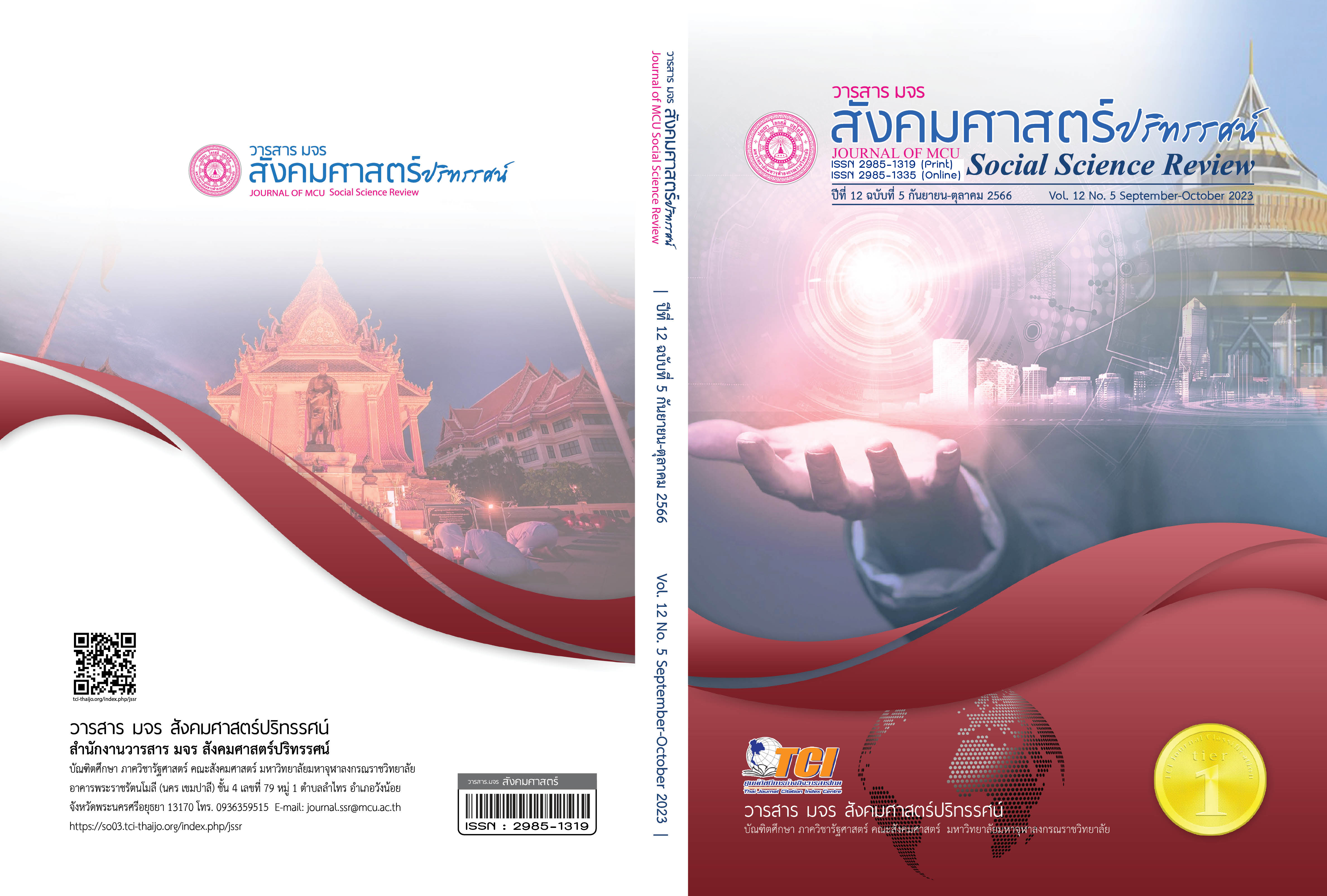การวิเคราะห์องค์ประกอบความสามารถในการจัดการเรียนรู้ในยุคดิจิทัลของครูโรงเรียนมัธยมศึกษา สังกัดสำนักงานคณะกรรมการการศึกษาขั้นพื้นฐาน
คำสำคัญ:
ความสามารถในการจัดการเรียนรู้, ยุคดิจิทัล, การวิเคราะห์องค์ประกอบเชิงสำรวจบทคัดย่อ
บทความวิจัยครั้งนี้มีวัตถุประสงค์เพื่อศึกษาองค์ประกอบของความสามารถในการจัดการเรียนรู้ในยุคดิจิทัลของครูโรงเรียนมัธยมศึกษา สังกัดสำนักงานคณะกรรมการการศึกษาขั้นพื้นฐาน โดยใช้ระเบียบวิธีวิจัยเชิงสำรวจ กลุ่มตัวอย่างที่ใช้ในการวิจัยครั้งนี้ เป็นคุณครูในโรงเรียนมัธยมศึกษา สังกัดสำนักงานคณะกรรมการการศึกษาขั้นพื้นฐาน ในเขตภาคเหนือตอนล่าง จำนวน 332 คน ซึ่งได้มาจากการสุ่มแบบแบ่งชั้นตามขนาดของสถานศึกษา เก็บรวบรวมข้อมูลด้วยแบบสอบถามแบบมาตราส่วนประมาณค่า 5 ระดับ จำนวน 54 ข้อ โดยมีค่าความเชื่อมั่นเท่ากับ 0.96 วิเคราะห์ข้อมูลโดยใช้การวิเคราะห์องค์ประกอบเชิงสำรวจ โดยสกัดองค์ประกอบด้วยวิธีวิเคราะห์องค์ประกอบหลัก และหมุนแกนแบบมุมฉาก ด้วยวิธีแวริแมกซ์
ผลการวิจัยพบว่า องค์ประกอบความสามารถในการจัดการเรียนรู้ในยุคดิจิทัลของครูโรงเรียนมัธยมศึกษา มีจำนวน 6 องค์ประกอบ ได้แก่ 1) การออกแบบการจัดการเรียนรู้แนวดิจิทัล 2) การจัดกระบวนการเรียนรู้ผสานเทคโนโลยีดิจิทัล 3) การอำนวยการเรียนรู้ผ่านสื่อดิจิทัล 4) การชี้แนวทางการเรียนรู้บนโลกดิจิทัล 5) การใช้เครื่องมือดิจิทัลเพื่อการเรียนรู้ และ
6) การสร้างเครือข่ายพัฒนาการเรียนรู้บนฐานดิจิทัล โดยทั้ง 6 องค์ประกอบเหล่านี้สามารถอธิบายความแปรปรวนความสามารถในการจัดการเรียนรู้ในยุคดิจิทัลของครูโรงเรียนมัธยมศึกษาได้ร้อยละ 48.101
เอกสารอ้างอิง
กระทรวงดิจิทัลเพื่อเศรษฐกิจและสังคม. (2559). Digital Thailand. สืบค้น 20 เมษายน2563, จาก https://www.dga.or.th/upload/download/file_9fa
กาญจนา เงารังษี. (2559). การศึกษากับการพัฒนาที่ยั่งยืน Education for Sustainable Development (ESD). Journal of the Association of Researchers, 21(2), 13-18.
เกียรติศักดิ์ ลำพองชาติ. (2563). ทักษะการทำงานในโลกยุคดิจิทัล (Working skills in the digital age). กรุงเทพฯ: สำนักงานเลขาธิการวุฒิสภา.
ธีระดา ภิญโญ. (2555). เทคนิคการวิเคราะห์องค์ประกอบสำหรับงานวิจัย. กรุงเทพฯ: เฟิร์นข้าหลวง พริ้นติ้ง แอนด์ พับลิชชิ่ง.
ถนอมพร เลาหจรัสแสง. (2560). ครูพันธ์ C (C-Teachers.). สืบค้น 18 พ.ย. 2564, จาก www.http://sornorinno.blogspot.com/2010/09/c-c-teacher.html
ไพฑูรย์ สินลารัตน์ (2559). การศึกษา 4.0 เป็นยิ่งกว่าการศึกษา (พิมพ์ครั้งที่ 4). กรุงเทพฯ: โรงพิมพ์แห่งจุฬาลงกรณ์มหาวิทยาลัย.
พิมพันธ์ เดชะคุปต์ และพเยาว์ ยินดีสุข. (2562). ทักษะ 7C ของครู 4.0 (พิมพ์ครั้งที่ 5). กรุงเทพฯ: โรงพิมพ์แห่งจุฬาลงกรณ์มหาวิทยาลัย.
สุกัญญา แช่มช้อย. (2560). การบริหารสถานศึกษาในยุคดิจิทัล. พิษณุโลก: พิษณุโลกดอทคอม.
สำนักงานคณะกรรมการพัฒนาการเศรษฐกิจและสังคมแห่งชาติ. (2559). แผนพัฒนาเศรษฐกิจและสังคมแห่งชาติ ฉบับที่12. สืบค้น 20 เมษายน 2563, จาก https://www.nesdc.go.th/ewt_w3c/ewt_dl_link.php?nid=6422
สำนักงานคณะกรรมการพัฒนาระบบราชการ. (2551). คู่มือการบริหารการเปลี่ยนแปลงเพื่อเสริมสร้างความเป็นเลิศในการปฏิบัติราชการของหน่วยงานภาครัฐ. กรุงเทพฯ: สำนักงานคณะกรรมการพัฒนาระบบราชการ.
สำนักงานเลขาธิการสภาการศึกษา. (2563). รายงาน เรียนออนไลน์ยุคโควิด-19: วิกฤตหรือโอกาสการศึกษาไทย. กรุงเทพฯ: สืบค้น 30 เมษายน 2564, จาก http://backoffice.onec.go.th/uploads/Book/1779-file.pdf
สำนักงานเลขาธิการสภาการศึกษา. (2557). แนวทางการพัฒนาการศึกษาไทยกับการเตรียมความพร้อมสู่ศตวรรษที่ 21. กรุงเทพฯ: พริกหวานกราฟฟิค.
สำนักงานเลขานุการของคณะกรรมการยุทธศาสตร์ชาติ. (2561). ยุทธศาสตร์แห่งชาติ. สืบค้น 20 พ.ค. 2563, จาก http://nscr.nesdb.go.th/ยุทธศาสตร์ชาติ
อติพร เกิดเรือง. (2560). การส่งเสริมการเรียนรู้ในศตวรรษที่ 21 เพื่อรองรับสังคมไทยในยุคดิจิทัล. วารสารวิชาการมหาวิทยาลัยราชภัฏลำปาง, 6(1), 173-184.
อ่องจิต เมธยะประภาส. (2560). E-Teacher คุณลักษณะของครูและนักเรียนในศตวรรษที่ 21. สืบค้น 18 พ.ย. 2564, จาก http://www.slideplayer.mcu.ac.th/?p=162
Ally, M. (2019). Competency Profile of the Digital and Online Teacher in Future Education. International Review of Research in Open and Distributed Learning, 20(2), 302-318.
Bazzano, D. (2011). Teaching skills: What 21st century educator need to learn to survive. Retrieved November 18, 2021, from https://www.master newmedia.org/teaching-skills-what-21st-century-educators-need-to-learn- to-survive
Churches, A. (2008). 21st century pedagogy. Retrieved January 10, 2020, from https://edorigami.edublogs.org/2008/08/16/21st-century-pedagogy
Comrey, A.L., & Lee, H.B. (1992) A First Course in Factor Analysis (2nd ed). Hillsdale, New Jersey: Lawrence Erlbaum Associated.
Redecker, C., & Punie, Y. (2017). European Framework for the Digital Competence of Educators: DigCompEdu. Luxembourg: Publications Office of the European Union.
Simmons, C. (2010). Teacher skills for 21st century. Retrieved November 18, 2021, from http://www.ehow.com/list_6593189_teacher-skills-21st-centur
Sharma, M. (2017). Teacher in a Digital Era. Global Journal of Computer Science and Technology, 17(3), 10-14.
White, J. (2015). Digital literacy skills for FE teachers. London: SAGE Publications.
ดาวน์โหลด
เผยแพร่แล้ว
รูปแบบการอ้างอิง
ฉบับ
ประเภทบทความ
สัญญาอนุญาต
ลิขสิทธิ์ (c) 2023 วารสาร มจร สังคมศาสตร์ปริทรรศน์

อนุญาตภายใต้เงื่อนไข Creative Commons Attribution-NonCommercial-NoDerivatives 4.0 International License.
เพื่อให้เป็นไปตามกฎหมายลิขสิทธิ์ ผู้นิพนธ์ทุกท่านต้องลงลายมือชื่อในแบบฟอร์มใบมอบลิขสิทธิ์บทความให้แก่วารสารฯ พร้อมกับบทความต้นฉบับที่ได้แก้ไขครั้งสุดท้าย นอกจากนี้ ผู้นิพนธ์ทุกท่านต้องยืนยันว่าบทความต้นฉบับที่ส่งมาตีพิมพ์นั้น ได้ส่งมาตีพิมพ์เฉพาะในวารสาร มจร สังคมศาสตร์ปริทรรศน์ เพียงแห่งเดียวเท่านั้น หากมีการใช้ภาพหรือตารางหรือเนื้อหาอื่นๆ ของผู้นิพนธ์อื่นที่ปรากฏในสิ่งตีพิมพ์อื่นมาแล้ว ผู้นิพนธ์ต้องขออนุญาตเจ้าของลิขสิทธิ์ก่อน พร้อมทั้งแสดงหนังสือที่ได้รับการยินยอมต่อบรรณาธิการ ก่อนที่บทความจะได้รับการตีพิมพ์ หากไม่เป็นไปตามข้อกำหนดเบื้องต้น ทางวารสารจะถอดบทความของท่านออกโดยไม่มีข้อยกเว้นใดๆ ทั้งสิ้น





